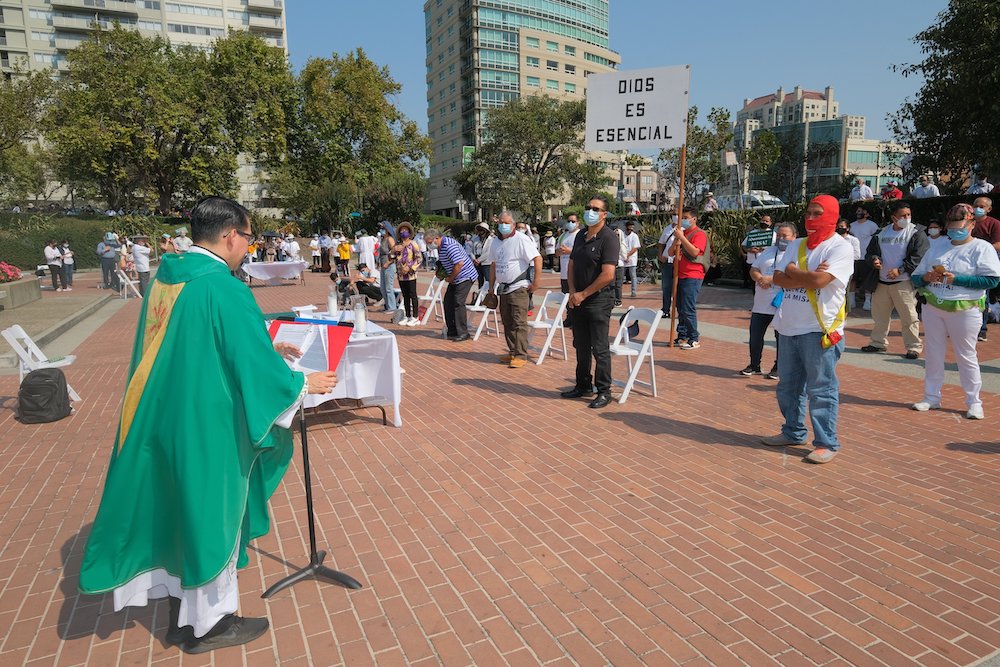
Catholics in San Francisco attend an outdoor Mass during a "Free the Mass" demonstration Sept. 20.(CNS/San Francisco Archdiocese/Dennis Callahan)
Would it surprise you to learn that among highly observant Catholics, Joe Biden is as popular as Donald Trump and trusted as much as the president to handle issues such as religious freedom, Supreme Court nominations and even the abortion issue?
This is exactly what a recent EWTN/Real Clear Opinion poll of 1,212 Catholic voters finds, though you can be forgiven for having missed this in the reporting of the survey. EWTN itself chose not to highlight these findings, opting to showcase a more predictable observation that Trump and the GOP are more popular among faithful Catholics than among less committed ones. This is technically true but obscures inconvenient facts for those who think that "real" Catholics are by and large Republicans and that "cafeteria" or cultural Catholics are mostly Democrats.
EWTN's reporting of its poll results (subsequently picked up by other outlets) notes that among daily communicants and those who attend Mass more than once a week, Trump leads Biden by fairly large margins. What they do not report, however, is that so few respondents to the survey fall into these categories, that these statistics are essentially useless.
For example, only 1% of those polled attend daily Mass. In a survey of 1,200 people that means that EWTN is highlighting a finding based on a dozen respondents. The margin of error for such a statistic is nearly +/-30. Similarly only 4% of respondents go to Mass more than once a week, so that particular figure is based on a sample of fewer than 50 people (with a margin of error of about +/-14). With samples this small and margins of error this large, we cannot describe the preferences of these groups with any reasonable level of confidence
For polls like this to tell us something meaningful about the Catholic population, the sample has to be reasonably large. This is why (one assumes) EWTN collapses the categories in the cross tabs of the results that they make available for download. Here we can observe the views of Catholics attending Mass at least weekly (339 respondents — with a margin of error of +/-6) and those who believe in "all or most" of the church's teachings (592 respondents — with a margin of error of +/-5).
Advertisement
The results are striking. When looking at Catholics who attend Mass weekly or more, Biden and Trump are tied at 44%. For those Catholics who believe in all or most of church teachings, Trump has a three-point advantage, but this is well within the margin of error. More bad news for Trump is that among observant Catholics, two out of five not only disapprove of him, but disapprove of him "strongly."
The EWTN poll also looks at the issues most concerning to Catholic voters. As noted elsewhere, topics like religious liberty and abortion do not even make the top 10, with issues like the economy, healthcare and the coronavirus leading the way.
This is not only true about Catholics in general, but also those who are most accepting of the church's teachings and those who attend Mass weekly or more. In fact, among both these groups, issues like climate change, the environment and income inequality are as much of a priority or concern as abortion, religious freedom and Supreme Court nominations. Even the federal deficit is of more concern to faithful Catholics than issues often referred to as "non-negotiable."
Perhaps more surprising are the results about whom Catholic voters trust more to handle key issues. Joe Biden is reported as more trustworthy on every issue except China policy. Though it is true that among more observant Catholics, Trump performs better, for the most part this just indicates that among the more faithful sub-group, the president is tied with Biden, not actually preferred to him.
While those who accept all or most of the church's teachings trust Trump to handle the economy better (50% to 41%), Catholics attending Mass weekly or more trust both the candidates equally (47% to 47%). On nearly every other issue, Trump is at best tied with Biden in terms of whom most observant Catholics trust. Even in areas that Trump has tried to highlight as signature issues — like criminal justice and immigration, he either trails Biden or is statistically indistinguishable from him. Meanwhile, weekly Mass attenders have a clear preference for Biden when it comes to issues like income inequality, race relations, climate change, the environment, K-12 education and healthcare.
What is perhaps most remarkable is that on the core issues to religious conservatives — abortion, religious liberty and Supreme Court nominations — there is no statistically significant difference between which candidate observant Catholics trust more.
Conservative and Republican Catholics have made great efforts to convince voters that their main (if not only) priorities should be those issues considered "non-negotiable" according to church teaching. This typically puts the emphasis on abortion and religious liberty, same-sex marriage, stem-cell research and euthanasia. Since the Republican Party is clearly more in line with Catholic doctrine in these areas, it is reasonable to expect that many observant Catholics would look more favorably on the GOP than the Democratic Party, all things being equal.
But if EWTN's poll is to be believed, Catholic Republicans have much work to do even among the most faithful, and Catholic Democrats have reason to be optimistic that they too have strength in numbers.
[Scott Liebertz is an assistant professor of political science and criminal justice at the University of South Alabama. He has a doctorate from Florida State University with concentrations in comparative politics and public policy. He previously was a high school teacher in Venezuela, American Samoa and Bridgeport, Connecticut.]



